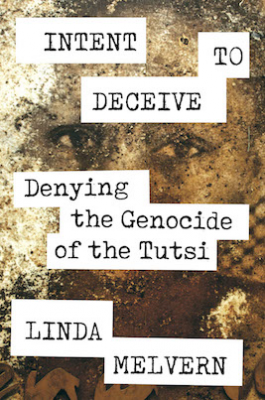Book: Intent to deceive: Denying the Genocide of the Tutsi

Intent to deceive: Denying the Genocide of the Tutsi by Linda Melvern, publisher: Verso Books, £11.99
Why is a book about genocide denial still important, 80 years after the Holocaust and 26 years after Rwanda? Because there is a thriving industry in spreading misinformation about massive human rights abuses, current and past.
Linda Melvern is the foremost expert on the Rwandan genocide, and her latest book picks apart the lies propagated about the 1994 genocide of the Tutsi ethnic group. She draws parallels with Holocaust denial which persists around the world. An Anti-Defamation League global survey in 2014 found that one in three people dispute the basic facts of the Nazi's systematic extermination of six million Jews. This matters in an age when political leaders, aided by their media cronies, sacrifice the truth to enhance their re-election chances.
Melvern shows the way in which even before the killing began in Rwanda, its supporters at the United Nations downplayed reports of the Hutu government propaganda campaign, aimed at stirring up hatred of the Tutsi. A tiny, poor African country was the third biggest arms buyer in the world, and yet no alarms sounded. Years of discrimination against the Tutsi were ignored, and when the killing began, French diplomats and officials muddied the waters, insisting it was a civil war, rather than one ethnic group massacring an unarmed minority. France armed the extremist Hutu regime and trained its soldiers; they continued to send planes full of weapons throughout the one hundred days of slaughter. France also evacuated and protected those implicated in killing, and still harbours them today.
Melvern illustrates how French officials have also blamed the victims for provoking the genocide, denying there was an ideological foundation for the extermination of the Tutsi. They perpetuate the idea that conflict in Africa is spontaneous, due to warring tribes, rather than being the carefully planned product of manipulative politicians.
Regrettably, elements in the Catholic church had apparently learned nothing from World War Two. In his 2019 book, "Stepp'd in Blood," the historian Andrew Wallis describes the manner in which the Rwandan church aligned itself with the regime, supporting its genocidal ideology and colluding in the massacres. There were brave exceptions who paid with their lives, but many priests allowed Tutsi to shelter in their churches and then locked the doors and summoned the killers.
At the height of the slaughter, the Vatican called for "both sides" to negotiate, ignoring the fact that the genocide was not a series of battles: well-armed militia were going from house to house with lists of Tutsi, systematically murdering unarmed civilians because of their ethnicity. This moral equivalence informed the BBC's documentary "the Untold Story," which blamed the Tutsi for triggering the genocide and claimed that the Hutu were in turn victims of a genocide. Melvern convincingly demolishes both theories with facts and evidence, rather than relying on the word of mercenaries.
Meanwhile, dozens of Rwandan genocidaires live in safety in the UK. Their extraditions were blocked because of the fear that they would not be granted a fair trial in Rwanda. Yet, the European Court of Human Rights has found that it is now safe to extradite them, as have several other countries which are sensitive to human rights concerns.
Lord Alton, who visited Rwanda in 2004, has raised the issue with the government several times. He comments,
"The UK needs to step up its work on fulfilling its duties under the Genocide Convention, not only to prevent genocide but also to punish the perpetrators. In the UK today, we have several alleged perpetrators of genocide living among us in impunity, including the alleged perpetrators of the Rwandan genocide, but also those involved in the Daesh genocide against religious minorities in Iraq. They have never been charged with genocide and by allowing them to believe that they are invulnerable to prosecution it creates the impression that we do not take seriously our duty to hunt down and bring to justice those responsible for the crime above all crimes."
LINKS
Rebecca Tinsley's NGO, Network for Africa, provides mental health training and support in Rwanda. See: https://network4africa.org/
Intent to deceive: Denying the Genocide of the Tutsi: www.versobooks.com/books/2945-intent-to-deceive


















